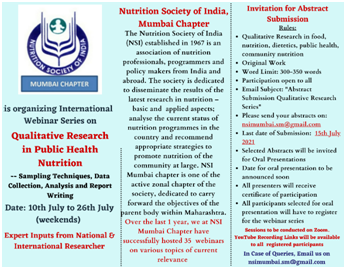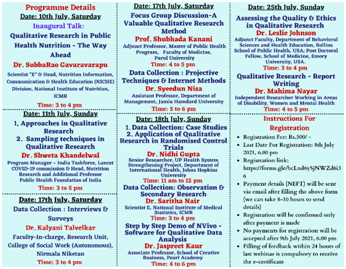Following the immense success of the Research Webinar Series conducted in July 2020, NSI Mumbai Chapter the 2nd research webinar series titled “Qualitative Research in Public Health Nutrition — Sampling Techniques, Data Collection, Analysis and Report Writing” from 10th July to 25th July 2021. This was 4th paid webinar series organized by NSI Mumbai Chapter. YouTube links are not available for this series.


Topic: Qualitative Research in Public Health Nutrition – The Way Ahead
Speaker: Dr. Subbarao Gavaravarapu (Scientist “E” & Head, Nutrition Information, Communication & Health Education (NICHE) Division, National Institute of Nutrition, ICMR)
Dr. Subbarao set the tone of the webinar series by delivering the inaugural address. He introduced the participant to concept of qualitative research, differences between qualitative and quantitative research, different methods of qualitative research, application, analysis and report writing in short. He shared many papers of qualitative research studies conducted in India.
Topic: Approaches in Qualitative Research & Sampling techniques in Qualitative Research
Speaker: Dr. Shweta Khandelwal (Program Manager – India Taskforce, Lancet COVID-19 commission & Head, Nutrition Research and Additional Professor, Public Health Foundation of India)
Dr. Khandelwal built on the foundation laid by Dr. Subbarao and focused on Qualitative research in depth. She shared information regarding various approaches for qualitative research such as ontological, epistemological, methodological. The six approaches of qualitative research were discussed[ethnography (cultural), grounded theory (emerging ideas), case studies, action oriented research, phenomenology ( experience), narratives]with help of easy to understand examples. Second part of the session was about the sampling in qualitative research. Dr. Khadelwal talked about the four sampling techniques used in qualitative research: purposive, quota, snowball and convenience sampling techniques. She also touched upon sample size calculation, validity and reliability in qualitative research.
Topic: Data Collection: Interviews & Surveys
Speaker: Dr. Kalyani Talvelkar (Faculty-In-charge, Research Unit, College of Social Work (Autonomous), Nirmala Niketan)
Dr. Talvelkar covered 2 topics: a) Qualitative survey b) Interviews. She explained that qualitative surveys use open-ended questions to produce long-form written/typed answers. Questions in qualitative survey aim to reveal opinions, experiences, narratives or accounts in the participant’s own words. Further the goals that necessitate a qualitative survey were discussed. She discussed core features of qualitative survey. Relevant examples were also discussed. In second part, Dr. Talvelkar discussed about interview method. She explained that qualitative interviewing consists of repeated face-to-face encounters between the researcher and informants directed toward understanding informants’ perspectives on their lives, experiences, or situations as expressed in their own words. The entire process of conducting interviews was discussed with relevant examples.
Topic: Focus Group Discussion-A Valuable Qualitative Research Method
Speaker: Prof. Shubhada Kanani (Adjunct Professor, Master of Public Health Program, Faculty of Medicine, Parul University)
Dr. Kanani started her session by explaining that Focus Group Discussions (FGDs) are in-depth discussions in which a small group of respondents (usually 6-10), guided by a facilitator or moderator, talk freely and spontaneously about themes considered important to the investigation. Examples of application of FGD’s were discussed. She emphasised that FGD is a valuable research tool as it stimulates responses, lessens inhibitions, helps generate new ideas, cost and time efficient tool. She then discussed in details the sample size, the method of conducting FGD, do’s and don’ts, etc. She also mentioned that one can combine participatory visual methods like matrix ranking, free listing and pile sorting with FGDs to make them more interesting. Finally reporting of the FGD which is critical was discussed with the help of an example.
Topic: Data Collection: Projective Techniques & Internet Methods
Speaker: Dr. Syeedun Nisa (Assistant Professor, Department of Management, Jamia Hamdard University)
Dr. Nisa started her session by discussing 6 projective techniques used in qualitative research: word association, cartoon tests, sentence completion, role playing, third-person techniques and picture interpretation/ story telling. Dr. Nisa shared examples of each of these techniques. Thereafter, Dr. Nisa described how qualitative research can be conducted online. She described various online qualitative research methods such as interview, internet observation/ document analysis, online FGD< online research forums/ blogs. She ended her session by describing the limitations of online qualitative research.
Topic: Data Collection: Case Studies and Application of Qualitative Research in Randomised Control Trials
Speaker: Dr. Nidhi Gupta (Senior Researcher, UP Health System Strengthening Project, Department of International Health, Johns Hopkins University
Dr. Nidhi started her session by describing how to conduct case studies. She discussed the “who, what, where and why” components of a case study. She also discussed the sampling unit of a case study and steps involved in case study. She ended the session by discussing strengths and weakness of case studies. In 2nd part of her session, Dr. Nidhi discussed the importance of using qualitative research in randomised control trials (RCT). She also discussed the potential value of qualitative research in RCT.
Topic: Data Collection: Observation & Secondary Research
Speaker: Dr. Saritha Nair (Scientist E, National Institute of Medical Statistics, ICMR)
Dr. Nair started her session by describing observation as a method for qualitative data collection. She described that observations range from counting something that happens, through to observing and/or coding behaviour. She described the process of observation method, tips on noting observations and report writing with help of relevant examples. She then discussed Secondary Research. In subjects such as history and classical studies, secondary data is usually the only available source of information. Data may include eye witness accounts, contemporary reports of events, or later reports. Historians generally give the greatest credence to the first, then the second, and finally the third, although there is a place for all of them in research. The entire process of conducting secondary research was discussed with relevant examples.
Topic: Step by Step Demo of NVivo – Software for Qualitative Data Analysis
Speaker: Dr. Jaspreet Kaur (Associate Professor, School of Creative Business, Pearl Academy)
Dr. Jaspreet gave detailed information of how to use NVivo software for Qualitative Data Analysis. She explained all steps including: process of importing files and types of files that can be imported in NVivo. She explained the process of coding on Nvivo manually as well as auto-coding of different files including images, audios, videos and PDFs. Analysis of codes to check if a code is correct or not was shown. She also described how to form a mind map and word cloud using Nvivo. The role of NCapture for downloading social media content was explained.
Topic: Assessing the Quality & Ethics in Qualitative Research
Speaker: Dr. Leslie Johnson (Adjunct Faculty, Department of Behavioral Sciences and Health Education, Rollins School of Public Health, USA; Post Doctoral Fellow, School of Medicine, Emory University, USA)
Dr. Leslie started her session by discussing the ethical considerations in qualitative research. She discussed about fair compensation for participants, considerations while collecting data, reflexivity, how to maintain participant anonymity. She also discussed methods of assessing quality of qualitative research including replication, triangulation and member checking. She concluded her session by sharing a check list for qualitative research.
Topic: Qualitative Research – Report Writing
Speaker: Dr. Mahima Nayar(Independent Researcher Working in Area)
Dr. Nayar discussed in details the process of writing a research paper based on qualitative data analysis. She described the features of academic writing and the building blocks for qualitative report writing: research diary and field notes. She also discussed about review writing and the pitfalls to avoid while writing a qualitative research report. She specially described the process of writing a case study and ended her session by describing the importance of referencing.